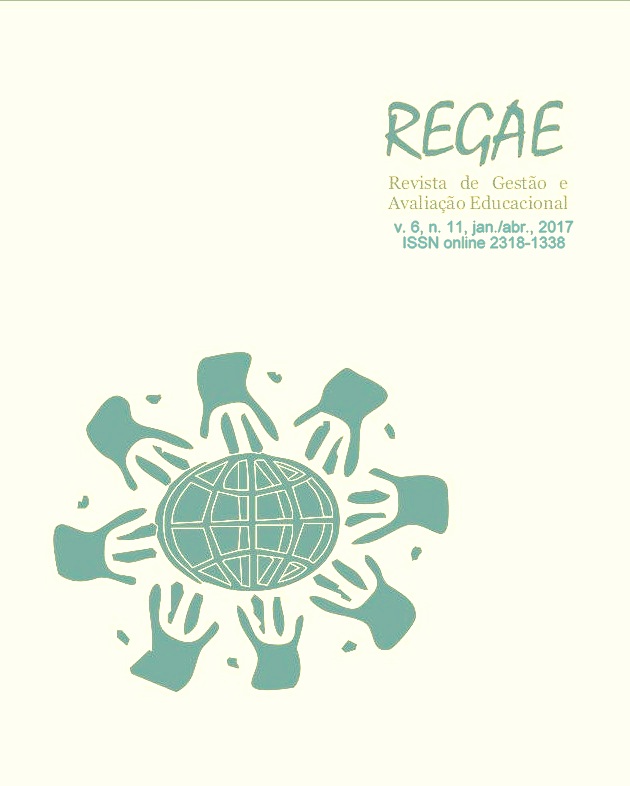The national pact to strengthening the secondary education: limits and possibilities to formation and acting of teacher in inclusive education area
DOI:
https://doi.org/10.5902/2318133818865Abstract
The absence of Inclusive Education thematic field in Teacher's Education Program of the Pact for Secondary Schooling Strengthening was enough to generate concerns, thinking and the will to start a theoretic study aimed at analyzing the range of Legal fundaments for special education politics on an inclusive perspective. Confronting this perspective with the possibilities and boundaries of teaching training/making in secondary school as proposed in the referred Pact. Inclusion of students with special needs in regular educational system is, nowadays, the main directive on educational public politics in federal, state and municipalities programs. Thus, how is it possible to create a national program for secondary schools teachers‟ training not taking into consideration the curriculum and teaching practices in an inclusive education perspective? Would it not seem a paradox to start such a Pact for strengthening secondary schooling, excluding the basic principles of inclusive education from the studies and experiences exchanges that take place in teachers training? More and more students with special needs are enrolling at regular schools, and their placement in regular classes, without the necessary teaching qualifications, tend to increase the evasion rates and the age - grade distortion and failure; aggravating the exclusion pictures at schools; and thus, of social discrimination. One cannot promote social integration, if do not, cannot, also include in teachers training, the thematic field of inclusive education. Seen in these terms, it is expected in this paper, to bring up a discussion on inclusive education in teacher‟s training program of Pact for Strengthening Secondary Schooling; proposing the insertion, in particular, of inclusive education as a thematic field, also suggesting the development of complementary material to that end.
Key-words: inclusive education, teachers training, exclusion.
Downloads
References
BRASIL. Pacto nacional pela alfabetização na idade certa: formação do professor alfabetizador: caderno de apresentação. Brasília: MEC, 2012.
BRASIL. Educação para todos: compromisso de Dakar. Brasília: Unesco, Consed, Ação Educativa, 2001.
BRASIL. Decreto n. 7.084 de 2010, Instituído o Pacto Nacional pela Alfabetização na Idade Certa, Diário oficial. Brasília, DF, 18 de dez. de 2012. Disponível em <http://pacto.mec.gov.br/images/pdf/port_1458_141212.pdf>. Acesso em 19 ago. 2015.
CHARLOT, Bernard. Da relação com o saber, elementos para uma teoria. Porto Alegre: Artmed, 2000.
DOURADO, LUIZ Fernandes, Políticas e gestão da educação básica no Brasil: limites e perspectivas. Educ. Soc., Campinas, v. 28, n. 100, 2007, p. 921-946.
GATTI, Bernadete Angelina; BARRETO, Elba S. S (coord.). Professores do Brasil: impasses e desafios. Brasília: Unesco, 2009.
GATTI, Bernadete Angelina. Análise das políticas públicas para formação continuada no Brasil, na última década. Revista Brasileira de Educação v. 13, n. 37, 2008, p. 57-70.
FREIRE, Paulo, Pedagogia da autonomia: saberes necessários à prática educativa. São Paulo: Paz e terra, 2002.
OLIVEIRA, Dalila Andrade. Das políticas de governo à política de estado: reflexões sobre a atual agenda educacional brasileira, Educ. Soc., Campinas, v. 32, n. 115, 2004, p. 323-337.
OLIVEIRA, Dalila Andrade, A reestruturação do trabalho docente: precarização e flexibilização. Educ. Soc., Campinas, v. 25, n. 89, 2004, p. 1127-1144.
TEIXEIRA, Celso Elenaldo. O papel das políticas públicas no desenvolvimento local e na transformação da realidade. Salvador: AATR-BA, 2002.
MARCELO, Carlos. Desenvolvimento profissional docente: passado e futuro. Revista de Ciências da Educação, n. 8, 2009, p. 7-22.
NÓVOA, António, Professores: imagens do futuro presente. Lisboa: Educa, 2009.
VAILLANT, Denise; MARCELO, Carlos, Ensinando a ensinar: as quatro etapas de uma aprendizagem. Curitiba: UTFRP, 2012.
SAVIANI, Dermeval. Formação de professores no Brasil: dilemas e perspectivas. Poíesis Pedagógica, Goiânia, v. 9, n. 1, 2011, p. 7-19.
Downloads
Published
How to Cite
Issue
Section
License
Authors keep copyright and concede to the magazine the right of first publication, with the work simultaneously licensed under the Creative Commons Attribution 4.0 International, non-commercial license with no derivative work, which allows to share the work with no author recognition and initial publication in this magazine.
Authors has authorization to overtake additional contracts separately, to distribute a non-exclusive version of the work published in this magazine: For example: to publish in an institutional repository or as a chapter of a book, with authorial recognition and initial publication in this magazine.
Authors are allowed and are encouraged to publish and distribute their work online. For example: in institutional repositories or in their own personal page – at any point before or during the editorial process, because this can result in productive changes, as well as increase the impact and the mention to the published work.






